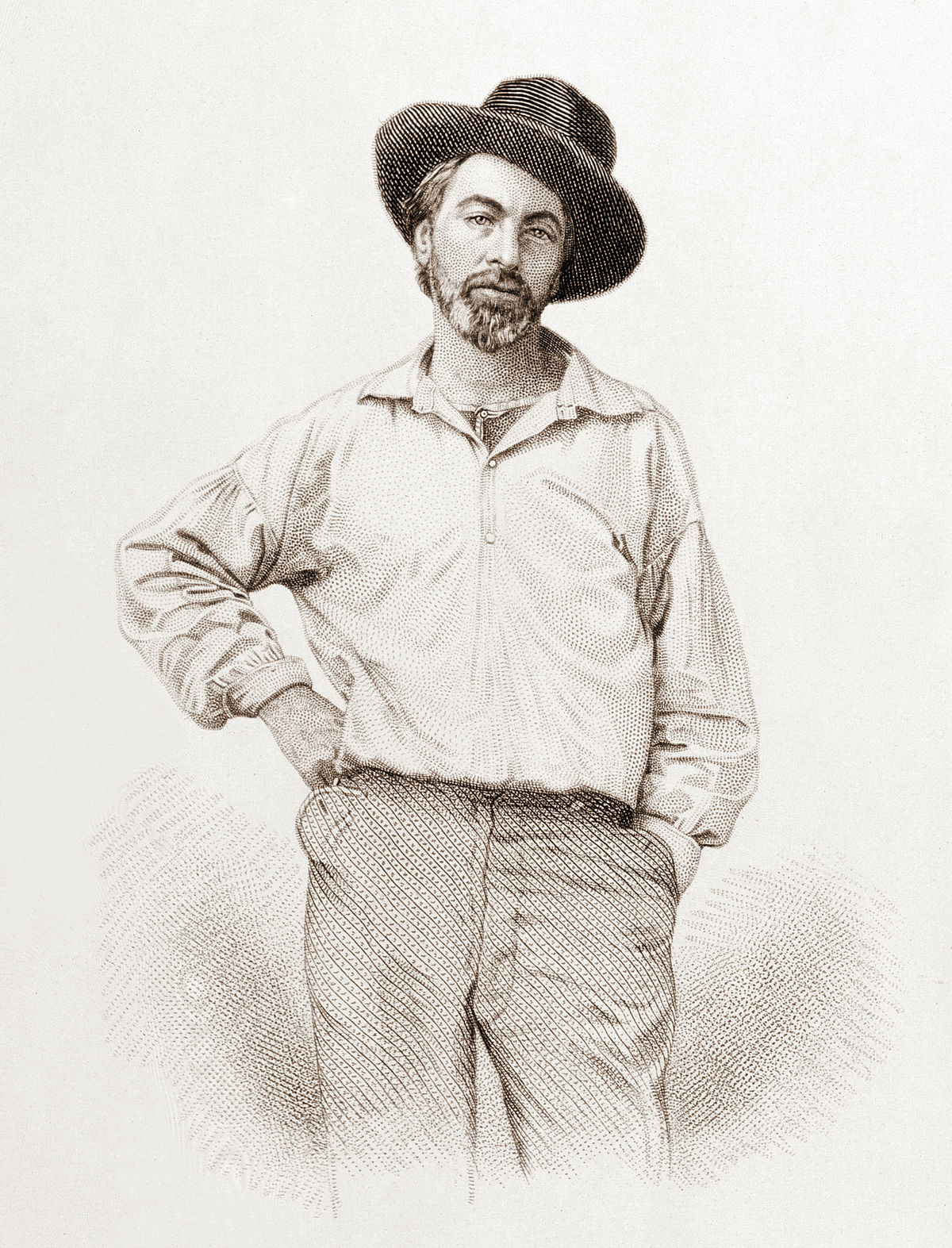Whitman through the Years
Delivered on 5/8/17 in Stuart, FL
Delivered on 6/30/17 in Dallas, TX
Who here has heard of the poet Walt Whitman? Today I want to give you a crash course on my favorite poet. Walt Whitman's career as the American poet starts in 1855 with the publication of Leaves of Grass, a book of 12 long poems. In an important sense, Leaves of Grass was Whitman's first and last book, because he revised and republished this same book 9 times over the next 4 decades. I choose to interpret these revisions as a metaphor for America and for Whitman himself: constantly and dramatically evolving over time.
So let's travel through time and take a look at 3 snapshot moments. For each snapshot, we'll look at the state of the country, then zoom into Whitman's life, and finally I'll give you a tiny little taste of his poetry.
Let's begin with 1855. America was only 80 years old, a thriving democracy going through growing pains. America was a house divided against itself on many issues, and the young nation was struggling to find its voice and forge its identity, different from Europe, uniquely American.
Around this time, a group bohemians started to band together New York City, including artists, comedians, actors, and of course a freelance journalist by the name of Walt Whitman.
This was his image in 1855. Notice the piercing eyes, casual pose and a working man's shirt (the leather jacket of the 1800s) --that’s how he presented himself. In fact, he printed this picture inside the first edition of Leaves of Grass.
Speaking of the the book, let me read to you from one of the original poems.
A child said, What is the grass? fetching it to me with full hands;
How could I answer the child?. . . .I do not know what it is any more than he.
I guess it must be the flag of my disposition, out of hopeful green stuff woven.
Or I guess the grass is itself a child
Or I guess it is a uniform hieroglyphic,
And it means, Sprouting alike in broad zones and narrow zones,
Growing among black folks as among white,
Kanuck, Tuckahoe, Congressman, Cuff, I give them the same, I receive them the same.
And now it seems to me the beautiful uncut hair of graves.
The literary elite welcomed this kind of poetry with high praise. You can tell it sounds democratic, expansive, and visionary. That’s as American as it gets.
Fast forward now to 1865, 10 years later. The factions and friction from the previous decade erupted into fratricidal war—brother murdering brother shedding blood all over the American landscape. After 4 years of carnage, Abraham Lincoln, the captain at the helm of a broken nation, was assassinated in cold blood.
After the civil war started, Walt Whitman moved to Washington DC, where he decided to become a war nurse and saw firsthand the horrors of war. That dark period took a toll on his body: look at how quickly he’s aged by the end of the war.
He added more and more poems to his book in new editions, where he recorded the sadness and the sweetness he shared with these dying young soldiers. Here’s a small section of a poem he wrote after the death of President Lincoln.
I saw battle-corpses, myriads of them,
And the white skeletons of young men, I saw them,
I saw the debris and debris of all the slain soldiers of the war,
But I saw they were not as was thought,
They themselves were fully at rest, they suffer’d not,
The living remain’d and suffer’d
Here, Whitman does the work of healing, of acknowledging and dressing the wounds of this national trauma.
Let's move forward in history again to 1890. This period in American history was a time of despair and unprecedented corruption with big businesses and political machines.
What happened to Whitman? He retired in New Jersey, where he continued to write. There were many pictures from this time period, but I liked this one the best.
As you can see, his body, once strong and healthy, began to fail him with a series of strokes. But you can also see those eyes gazing at Peter Doyle, Whitman's partner and companion for many years.
In Whitman's last poems, he talked a lot about death, love, and sex. His writing had less bravado and more intimacy, and I think that’s a result of his close experience with these subjects. Here's one of my favorites.
YOU bards of ages hence! when you refer to me, mind not so much my poems,
But come, I will take you down underneath this impassive exterior—I will tell you what to say of me:
Publish my name and hang up my picture as that of the tenderest lover
The friend, the lover's portrait, of whom his friend, his lover, was fondest,
Who was not proud of his songs, but of the measureless ocean of love within him—and freely poured it forth
I believe that last picture is exactly how he’d like to be remembered.
Thanks for riding along with me on this very short historical and literary journey! I could spend hours talking about this man and this book, but I hope this quick overview sparked your interest to read more. I'll leave you with a powerful line from Leaves of Grass, from Whitman himself: “This is no book. Whoever touches this, touches a man.”


